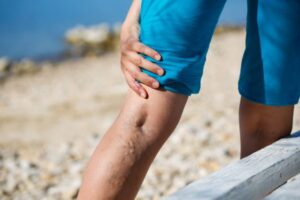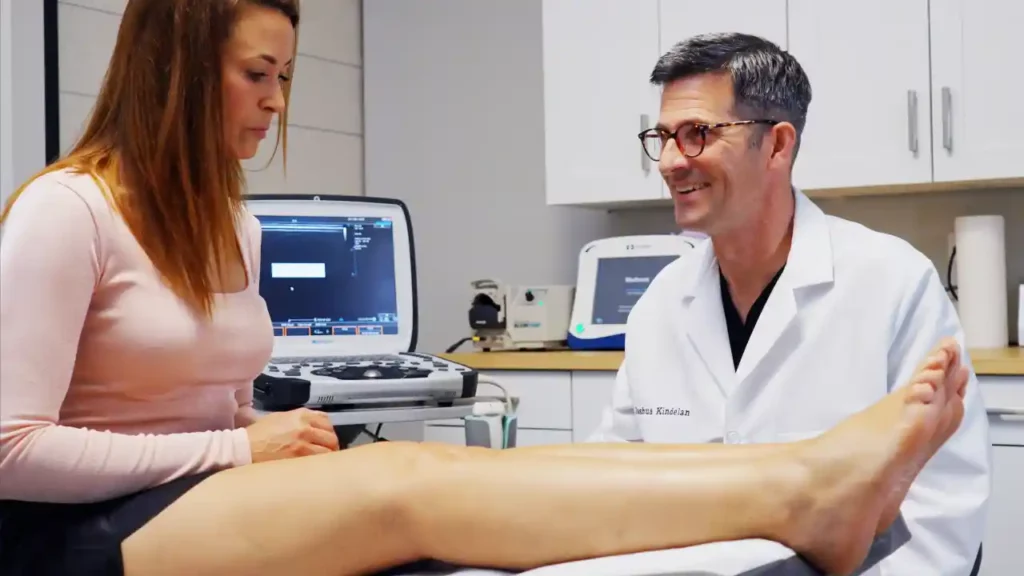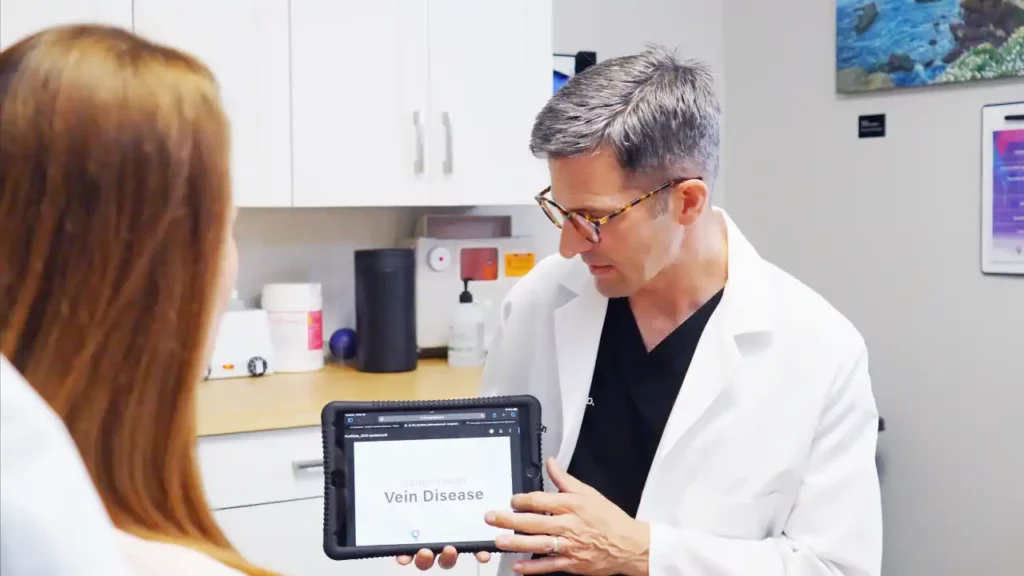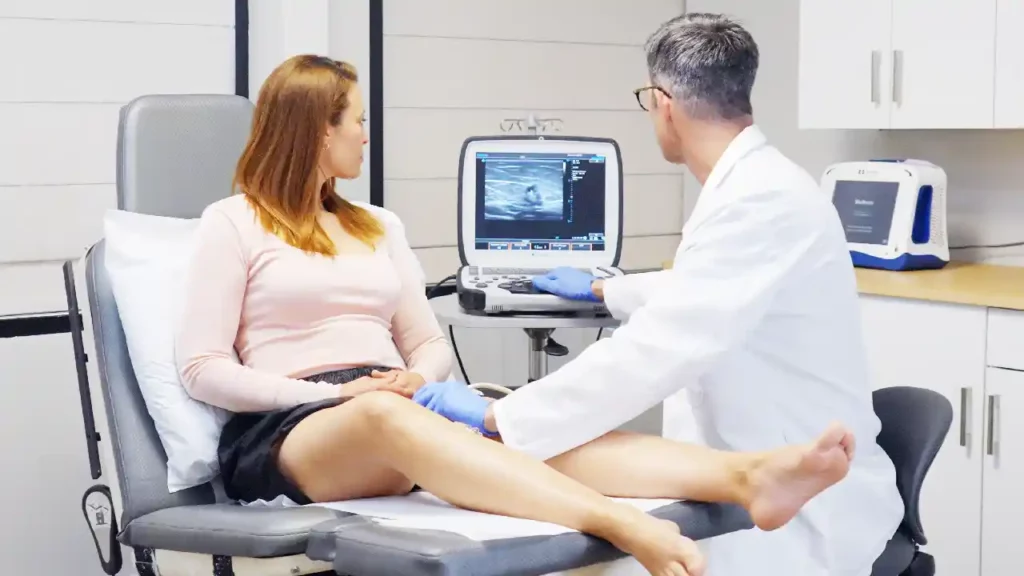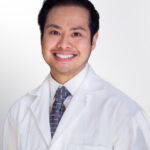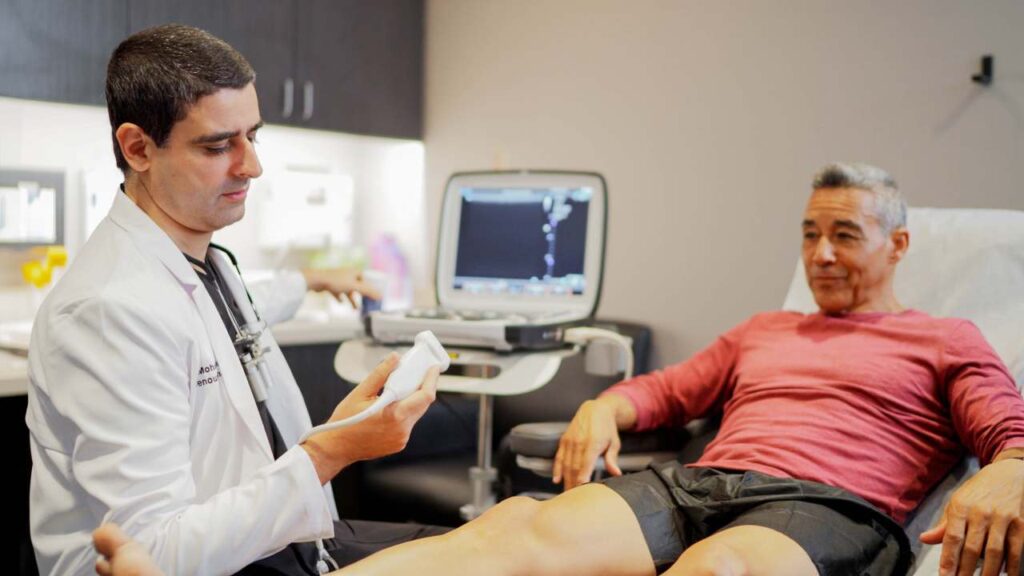What is a doctor who specializes in veins called?
A doctor who specializes in veins is called a “phlebologist.” The name comes from “phlebology,” which is the branch of medicine dealing with vascular health. Phlebologists diagnose and treat the root cause of your vein problems, such as spider veins, varicose veins, restless leg syndrome, and deep vein thrombosis. They might perform diagnostic tests to visualize the blood flow in your leg veins, determine if you have chronic venous insufficiency, and curate the ideal minimally invasive vein treatment plan.
However, it’s worth emphasizing that vein doctors come from all fields of medicine, including anesthesiology and dermatology. As long as they have the bare minimum training in vein problems, they can qualify as vein doctors. Furthermore, you can also find vein treatments offered in medical spas by nurse practitioners and doctors without sufficient training in vein problems — they usually focus on cosmetic relief rather than addressing the root cause of spider veins.
As such, all vein doctors aren’t equally good, and you should select your phlebologists carefully:
- Look for ABMS board-certified vein doctors. The American Board of Venous and Lymphatic Medicine (ABVLM) is an organization that formally recognizes the country’s leading vein doctors if they complete a complex set of professional milestones.
- Look for vein doctors and phlebologists who have completed a reputable residency program or fellowship training in minimally invasive spider vein and varicose vein treatments. This guarantees that the vein doctor specializes in the latest vein treatments.
- When you consult the vein doctor, they must examine your leg veins and schedule a comprehensive ultrasound diagnostic test, known as duplex ultrasound. This test reveals the root cause of your vein problems, guaranteeing comprehensive treatments.
- The vein doctor should only recommend minimally invasive spider vein and varicose vein treatments. If they recommend surgical treatments, such as vein ligation, you must look for other vein doctors. Surgical treatments are needlessly risky and complicated.
- The vein doctor should actively help with insurance coverage. Spider vein and varicose vein treatments are deemed medically necessary if you have underlying vein disease, so they should actively provide free insurance verification before your procedure.
What does a phlebologist do?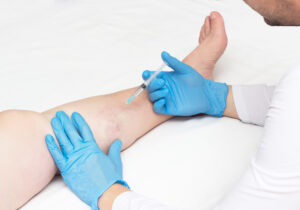
As mentioned previously, a phlebologist is someone who specializes in the diagnosis and treatment of vascular conditions and problems. They examine your leg veins, run advanced vascular imaging tests, and curate personalized treatment plans. Rather than focusing on cosmetic relief, they identify and diagnose the root cause of your vein problems. You can contact phlebologists for all vein-related problems.
The following are some of the most common vein problems treated by phlebologists:
- Chronic Venous Insufficiency: Healthy veins contain valves that ensure smooth one-way blood circulation to the heart, often against the force of gravity. When your vein valves collapse or malfunction, blood flows backward and accumulates in your leg veins, leading to numerous vein problems, such as spider veins and varicose veins.
- Spider Veins: These are dense clusters of red, blue, or greenish veins visible just underneath the skin’s surface. They’re usually symptomatic of chronic venous insufficiency.
- Varicose Veins: These are large blood vessels that bulge out of the skin’s surface because of excessive vascular dilation caused by blood accumulation. They might look like large, twisted, tangled, and knotted ropes or tree branches.
- Restless Leg Syndrome: This is a medical condition wherein you have an incessant need to move or shake your legs, especially at night, which can lead to insomnia and general exhaustion during the day. Restless leg syndrome might be caused by vein disease.
- Frequent Leg Cramps: Most people experience leg cramps occasionally, but frequent leg cramps can be indicative of chronic venous insufficiency, especially if they worsen at the end of the day. Leg cramps lead to sudden, involuntary muscle spasms originating in the legs.
- Leg Heaviness: The accumulation of blood in leg veins can lead to extreme leg heaviness and exhaustion. The symptoms usually worsen at night or after long periods of inactivity.
- Leg Ulcers: Effective blood circulation is necessary to heal wounds. The lack of proper blood circulation in the legs (due to vein disease) can lead to the formation of non-healing wounds, also known as leg ulcers.
- Deep Vein Thrombosis: The continued accumulation of blood in leg veins may lead to deep vein thrombosis, i.e., blood clots in the veins. This is a dangerous condition because the blood clots can break and travel to the lungs, inducing a potentially fatal pulmonary embolism.
What can I expect at a vascular doctor?
When you visit a vascular doctor, you can expect a thorough diagnosis and treatment of the root cause of your vein problems. However, different vein doctors and phlebologists follow different treatment plans. We can only provide an overview of our comprehensive vein treatment protocol, designed specifically to ensure long-lasting results without vein disease recurrence or complications.
The following is an overview of our diagnosis and treatment process:
- The vein doctor examines your leg veins, including the spider veins and varicose veins.
- The vein doctor asks about your symptoms, such as leg heaviness, restless leg syndrome, frequent leg cramps, etc.
- The vein doctor administers an ultrasound scan to visualize the blood flow in your leg veins and determine if you have chronic venous insufficiency.
- The vein doctor curates a personalized vein treatment plan to treat spider veins, varicose veins, and chronic venous insufficiency.
- If you have vein disease, the vein doctor may recommend radiofrequency ablation, endovenous laser ablation, or venaseal. These procedures close or destroy the diseased saphenous vein, restoring effective blood circulation to the heart.
- If you don’t have vein disease, the vein doctor may recommend sclerotherapy or ambulatory phlebectomy. These procedures are used to remove spider veins and varicose veins from the skin’s surface, thereby restoring optimal cosmetic appearance.
- Finally, the vein doctor will discuss your aftercare guidelines and you can resume your daily activities and work.
Please schedule an appointment at our vein treatment clinics in California for a diagnosis and treatment of your vein problems.
